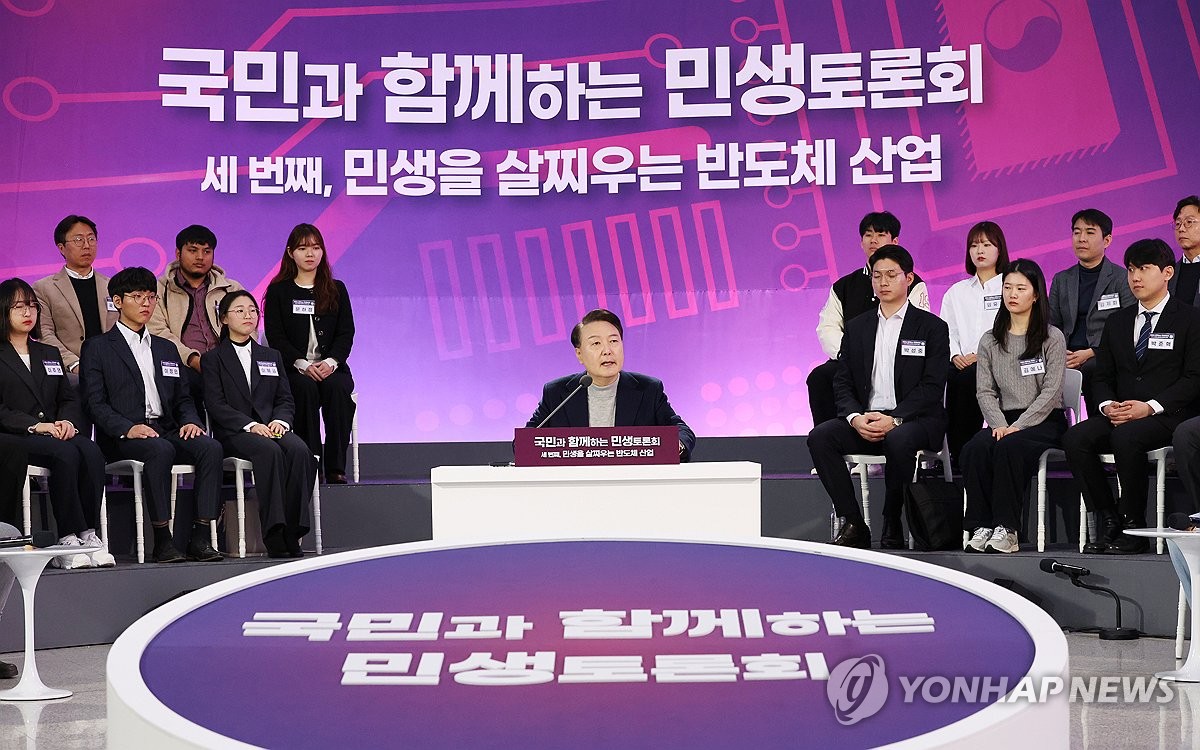- California Assembly OKs highest minimum wage in nation
- S. Korea unveils first graphic cigarette warnings
- US joins with South Korea, Japan in bid to deter North Korea
- LPGA golfer Chun In-gee finally back in action
- S. Korea won’t be top seed in final World Cup qualification round
- US men’s soccer misses 2nd straight Olympics
- US back on track in qualifying with 4-0 win over Guatemala
- High-intensity workout injuries spawn cottage industry
- CDC expands range of Zika mosquitoes into parts of Northeast
- Who knew? ‘The Walking Dead’ is helping families connect
Yoon says ‘semiconductor mega cluster’ outside Seoul will create 3 mln jobs
President Yoon Suk Yeol said Monday that a semiconductor industry cluster being built outside Seoul is expected to create at least 3 million jobs over the next 20 years.
Yoon made the remark during a policy debate held at Sungkyunkwan University’s Natural Sciences Campus in Suwon, 30 kilometers south of Seoul, the third in a series of debates on people’s livelihood issues.
The plan for a “semiconductor mega cluster” was announced last year and envisions the creation of a hub for chip companies and research centers in cities across southern Gyeonggi Province, including Pyeongtaek, Hwaseong, Yongin and Icheon.

On Monday, the government unveiled measures to support the cluster, which is expected to be completed in 2047 with the investment of 622 trillion won (US$472 billion) from Samsung Electronics Co. and SK hynix Inc. and other companies, such as by extending tax credits and building a new power plant running on liquefied natural gas in Yongin.
“Our initial estimate is an investment of 622 trillion won, which has started already, and over the next 20 years, we expect it to newly create at least 3 million quality jobs,” Yoon said, noting that in the shorter term, 158 trillion won will be invested over the next five years, creating 950,000 jobs.
“Currently our chip sector has 180,000 jobs, but once the cluster is completed, this fab alone will produce 70,000 more jobs,” he said, before citing an expected increase of 200 trillion won in sales for related industries, such as design, parts and materials.
Yoon said nuclear power has become indispensable for the stable supply of electricity not only to the chip industry but also to other cutting-edge industries, disputing the signature nuclear phaseout policy of his predecessor, Moon Jae-in.
He also vowed to extend tax credits for investments in the semiconductor industry, which are due to expire this year, and dismissed criticism that the scheme favors big businesses only.
“I think we have to make it clear once again that such talk is nothing but false instigation,” he said. “If tax credits lead to greater investment by semiconductor businesses, all businesses in the same ecosystem will greatly increase their profits and jobs, leading to an increase in state tax revenues.”
Samsung Electronics is currently the world’s largest memory chip maker.
Yoon credited the company’s late founder Lee Byung-chull, as well as former President Park Chung-hee, with paving the way for South Korea’s rise to a global chip powerhouse.
“Our country really had some pioneers,” he said, noting that Park set aside a budget equivalent to the annual budget of the Seoul metropolitan government at the time to invest in the semiconductor industry and entrusted Lee with nurturing the sector.
“Chairman Lee Byung-chull saw at the time how in Japan, large scale integrated circuits were becoming chips and it was receiving large orders from the United States and producing them,” he recalled. “He started by thinking that’s where we should stake our national destiny, and experienced many ups and downs.”









![배우 김민희와 홍상수 감독[스타뉴스]](http://www.koreatimesus.com/wp-content/uploads/2025/04/20250408101705671-120x134.jpg)

